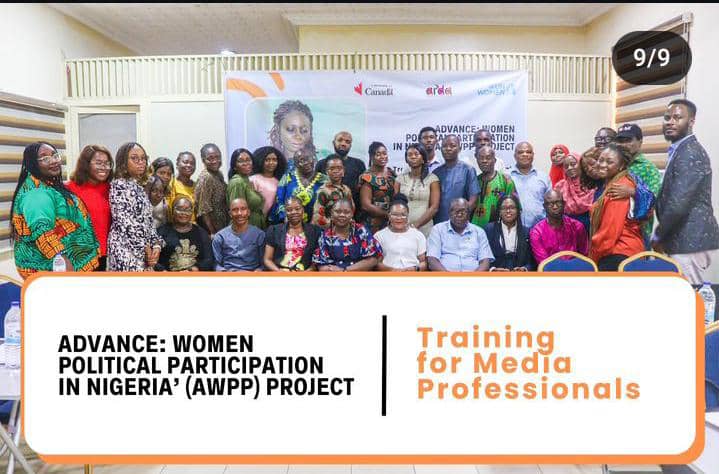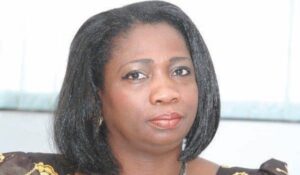
UN, ARDA trains journalists to promote women participation in Nigeria politics
By Omolola Dede Adeyanju
ARDA Development Incorporated in collaboration with the United Nations Women and other partners have held a day capacity building training for media professionals as part of the activities implemented under the Advance: Women Political Participation in Nigeria (AWPP) Project, funded by the Government of Canada through the UNWomen to promote women participation in Nigeria politics.
In view of this, the Senior Programme Officer, ARDA Development Communication Incorporated, Priscilla Fiberesima who doubles as the training programme manager with ARDA as a media partner for the project expressed that the event was put together to encourage media professionals to commence support for women’s political participation and women in political leadership and governance in advance.
According to Priscilla, ARDA understands the huge role the media plays in shaping perceptions. “It’s very important that we are able to shift the narratives so that people can support women’s political participation. We are also aware of the barriers that exist in culture and religion. We know these things are things that Nigerians hold dear.”
Hence, she stated that If one tries to make a change at all, there usually are push backs. However, she declared that the organization has seen and identified these things and has seen the push backs at the current, when it comes to the number of women that are involved in political processes.
The program manager therefore stressed, “So right now, we are trying to start early and we think that if the media comes on board on this initiative, we would be able to achieve more, be in one voice and together we would be able to change the perception, change the narratives, then come next election, we would see more women in political participation.”
Speaking in respect to The Advance Women in Political Participation(AWPP) Project, she said, “This group has several partners and is funded by the government of Canada through UN Women. UN Women brought a lot of partners on board and ARDA is one of them as the media partner.
“But there are also other partners on the field handling other different things like training, some addressing policy change, policy implementation. Different partners handle different angles. All of us working together is a consortium to make sure that if we all bring our strength together then we can all be able to achieve the aim.” She added.
Furthermore, Managing partner, WGC Gender Consulting Organization Dunsin Olusanya who facilitated the training sessions, examined the importance of women’s increased participation in politics. She enumerated the fact that women makeup over fifty percent of the Nigerian population. “Therefore with women having the highest population, if they are not in places of decision making, then there’s a problem”, She said.
Noting that women input is needed, she submitted that women have to speak up for themselves, Women need to be more invested in the political sector to represent accordingly. In terms of political participation, Olusanya disclosed that language shouldn’t be a barrier, “we don’t need to speak in English, even if it is vernacular, as long as we are being understood and a message is passed”
In evaluation, the capacity building had five training sessions. The first being on how women are represented in the federal level, mostly in the house of assembly. The facilitator submitted that we can see that women’s representation is very low. At the federal and state level, there has not been a female president or Governor in Nigeria. These are parts of the things we are looking at.
The second session examined the role of international frameworks and legal frameworks, with the facilitator explaining, “we realized there’s no shortage of a legal framework and protocols, there is the constitution, maputo protocol but there are no implementations.” She said,
For Gender sensitivity and the role of the media in agenda setting and influencing policy change to advance women’s representation in political leadership and governance across elective and appointive positions. Olusanya noted that We need to shun unconscious bias and stereotypes in the media about how women are represented in politics and life generally.
Regarding Violence against women in governance, sexual, physical violence and assaults; she expressed that some of the drivers of these malpractices are culture, tradition, power because some men want to hold and clinch on to power so they propel most of the worst violence against women in politics.
However, the facilitator submitted that for Gender sensitive reporting the media should be more factual in reporting the female gender, rather than Victim shaming or reporting physical appearance of what they are wearing, they should promote women’s political participation, avoiding harm and sensationalism, instead, the professional ethics of reporting should be upheld.
The way forward according to Dunsin Olusanya is for us to come together to support women, including the media. She emphasized, “We should support women and the girl child, helping women from a very young age is key. In our estates, institutions, and in all sectors, women should be in leadership roles and speak up for themselves.”
Representing the United Nations Women, program specialist, governance and participation in Public life, Chundung Ashley Dauda wrapped the capacity building training reiterating major points raised and calling the media to action with the commencement and implementation of the course in promoting women for political participation in Nigeria.




